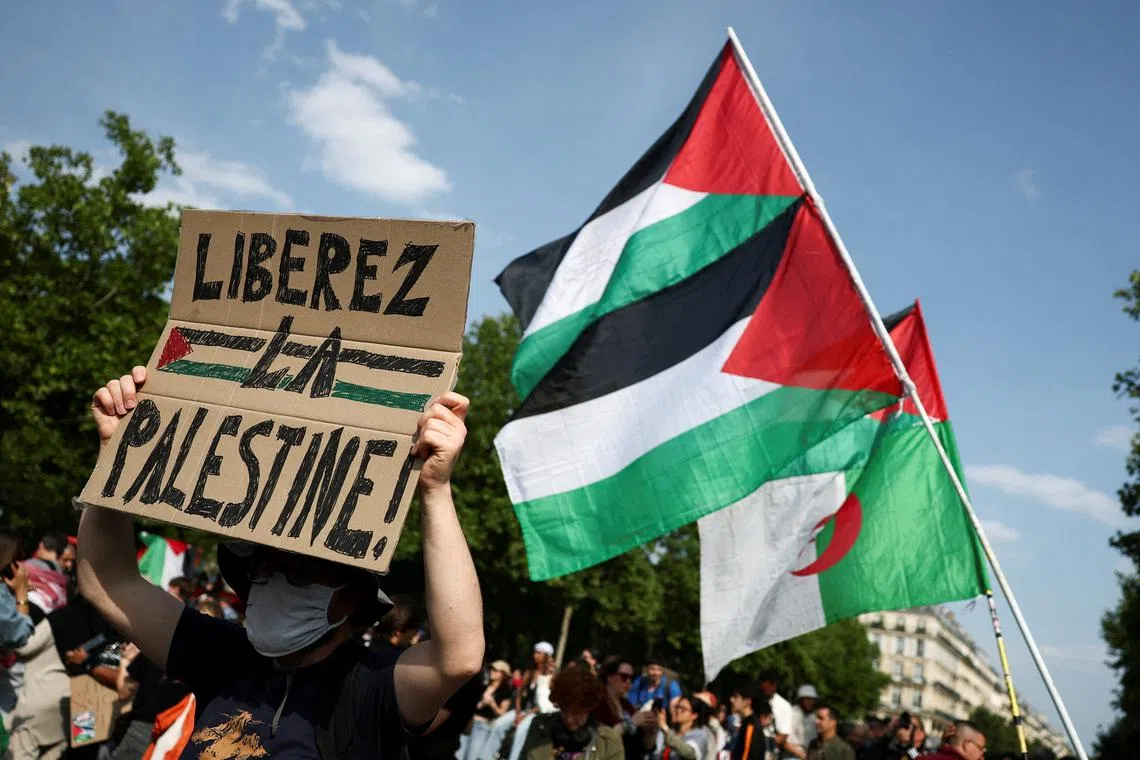How Gaza exasperation pushed three Israel allies towards recognising Palestinian state
Sign up now: Get ST's newsletters delivered to your inbox

More than three-quarters of the 193 members of the UN General Assembly already independently recognise a Palestinian state.
PHOTO: REUTERS
OTTAWA/PARIS/LONDON – When Spain, Ireland and Norway announced in May 2024 that they would recognise a Palestinian state, Israel’s closer allies dismissed the move as unhelpful to solving the crisis in Gaza.
While France, Britain and Canada stressed their support for establishing two states with recognised borders as the long-term solution to the Israel-Palestinian conflict
“I will not do an ‘emotional’ recognition,” French President Emmanuel Macron said at the time.
But as Israeli restrictions
France and Saudi Arabia formed a plan to have more Western countries move towards Palestinian recognition, while Arab states would be pushed to take a stronger line against Hamas. The pair wanted their proposals to gain acceptance at a United Nations conference in June, but they struggled to gain traction. The meeting was then postponed due to Israeli air strikes on Iran and amid intense US diplomatic pressure.
The strikes led to a pause in public criticism of Israel from Western allies, and Arab states were hard to win round, but discussions continued behind the scenes. Mr Macron, Mr Carney and British Prime Minister Keir Starmer were communicating with one another regularly by phone and texts in June and July, said a Canadian source with direct knowledge of the events.
Canada was wary of acting alone and Britain wanted to ensure any move would have maximum impact, but Mr Macron was more strident. Alarm was growing about images of starving children, and fears were mounting that Israel’s Gaza offensive, combined with settler attacks on Palestinians in the West Bank, would further undermine any chance of creating a sovereign Palestinian state.
On July 24, Mr Macron made a surprise announcement that France would recognise a Palestinian state at the UN General Assembly in September.
Neither Britain nor Canada followed immediately. But the relatively muted reaction by US President Donald Trump – saying the statement carried no weight but that Mr Macron was still a “great guy” – brought some reassurance that the diplomatic fallout would be manageable if others went the same way.
Mr Macron spoke with Mr Starmer and German Chancellor Friedrich Merz two days later to discuss a “sustainable route to a two-state solution”, according to Mr Starmer’s spokesperson, just before the Prime Minister was due to meet Mr Trump in Scotland.
With Mr Trump, Mr Starmer pressed the case to do more to help Gaza, although, according to Mr Trump, he never explicitly said a recognition plan was on the cards. Mr Trump has since criticised such moves as “rewarding Hamas”.
With Mr Trump still in Britain on July 29, opening a golf course, Mr Starmer recalled his Cabinet from their summer break to get approval for his recognition plan. Britain would recognise a Palestinian state in September unless there was a ceasefire and a lasting peace plan from Israel.
Like Mr Macron, Mr Starmer gave Mr Carney a few hours’ warning. Once Britain and France had moved, Canada felt it had to follow suit, according to the Canadian source. “International cooperation is essential to securing lasting peace and stability in the Middle East and Canada will do its best to help lead that effort,” Mr Carney said on July 30, six days after Mr Macron’s announcement.
In practical terms, the three countries’ move will not change much. US Secretary of State Marco Rubio dismissed the recognition as “irrelevant” while the other major Group of Seven allies – Germany, Italy and Japan – have given no indication they will follow suit.
More than three-quarters of the 193 members of the UN General Assembly already independently recognise a Palestinian state. But the opposition of the US, with its veto power on the UN Security Council, means the UN cannot admit Palestine as a full member – a move that would effectively recognise a Palestinian state at the global level.
However, Mr Richard Gowan, UN director at the International Crisis Group, said the declarations mattered “precisely because we are seeing some big US allies catching up with the bulk of the Global South on the Palestinian question at the UN”. “That makes it a little harder for Israel to write off the pro-recognition camp as irrelevant.” REUTERS


